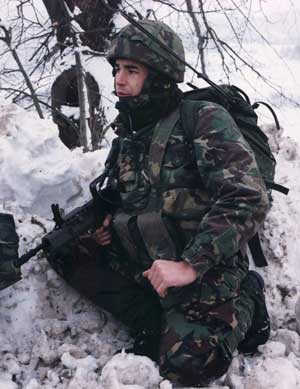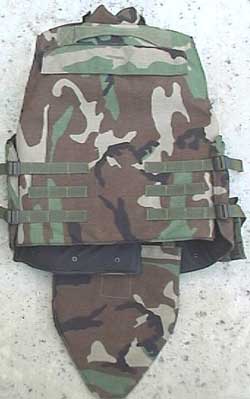| INDEX
Home
Weapons
Photo Galleries
News
Humor
Pages
New
Stuff
Contact Me
|
British
Army now too weak to fight war
GETHIN CHAMBERLAIN DEFENSE
CORRESPONDENT - The Scotsman
December 11, 2003
|
 BRITAIN
is no longer capable of launching a major military
action against another nation state without the help
of the United States, the UK government conceded
yesterday. BRITAIN
is no longer capable of launching a major military
action against another nation state without the help
of the United States, the UK government conceded
yesterday.
The admission, in the long-awaited defense white
paper, coincided with the publication of a damning
report on the handling of the war in Iraq and an
accusation from the chairman of an influential Commons
committee that British troops in Iraq had been
"shamefully let down" by the government.
The report, published by the National Audit Office (NAO),
described the campaign in Iraq as a significant
military success but lambasted the government for
sending troops into combat without adequate equipment,
including weapons, ammunition, body armor and medical
supplies.
The findings were described by Edward Leigh, the
chairman of the Commons public accounts committee, as
an "outrage".
"We expect the men and women of the armed forces to
fight and maybe die for us. So it is an outrage that
they could not expect all of the proper equipment,
protection and even clothing to do the job we ask of
them. They were shamefully let down," he said.
 |
|
Geoff
Hoon
UK Defense secretary
|
The report was published less than an hour before
Geoff Hoon, the Defense Secretary, stood up in the
Commons to introduce the defense white paper,
Delivering Security in a Changing World.
The document, the result of a lengthy review of
defense policy, heralded a change in British military
thinking, away from the doctrines of the Cold War and
a reliance on heavily armored forces towards lighter,
more mobile forces which could be deployed quickly to
trouble spots around the world.
Mr Hoon revealed a number of cuts in British forces,
including an immediate reduction of the number of
Challenger 2 main battle tanks in favor of a new light
brigade, and future cuts in naval and air forces.
 Speculation that the white paper would also include
plans to axe historic regiments, including some of the
most famous Scottish forces, proved unfounded. Mr Hoon,
who had already pledged not to do away with regiments
such as the Black Watch and the Royal Scots, deferred
any decision on the restructuring of the army until
next year.
Speculation that the white paper would also include
plans to axe historic regiments, including some of the
most famous Scottish forces, proved unfounded. Mr Hoon,
who had already pledged not to do away with regiments
such as the Black Watch and the Royal Scots, deferred
any decision on the restructuring of the army until
next year.
But the white paper did indicate a drastic reappraisal
of the countryís military capabilities. Britain, it
said, could never again mount an independent campaign
against another nation state.
"The most demanding expeditionary operations,
involving intervention against state adversaries, can
only plausibly be conducted if US forces are engaged,
either leading a coalition or in NATO," it said.
"The significant military contribution the UK is able
to make to such operations means that we secure an
effective place in the political and military
decision-making processes.
"To exploit this effectively, our armed forces will
need to be inter-operable with US command and control
structures, match the US operational tempo and provide
those capabilities that deliver the greatest impact
when operating alongside the US."
The first changes will see the armyís three heavy
brigades cut to two, and the creation of a new light
brigade.
Addressing the Commons, Mr Hoon said that in future,
the emphasis would be on using technology to deliver
the maximum military effect. He warned that the
proliferation of weapons of mass destruction and the
threat posed by international terrorists, coupled with
the consequences of failed or failing states,
presented Britain with very real and immediate
challenges.
Mr Hoon also played down the criticism of the
government in the NAO report.
But last night, the widow of a British soldier killed
in Iraq accused the Defense Secretary of failing to
make sure that frontline troops were given vital
protective kit.
Samantha Roberts said her husband, Steve, died because
he was wearing a flak jacket without the normal
protective ceramic plates fitted.
The NAO report was highly critical of the supply of
body armor, noting that 200,000 sets of body armor
issued since the Kosovo campaign has simply
disappeared.
"Steve is dead, they canít bring him back, but what
they can do is stop this thing happening again. I am
speechless," Mrs Roberts said.
The NAO report painted a chaotic picture with
commanders simply unable to locate where their
supplies were.
Many of the problems were exacerbated because, under
pressure from the Treasury, the Ministry of Defense
held only limited stocks of some equipment in order to
cut costs.
See Tony's
Personal SpectraShield Body
Armor
|
|